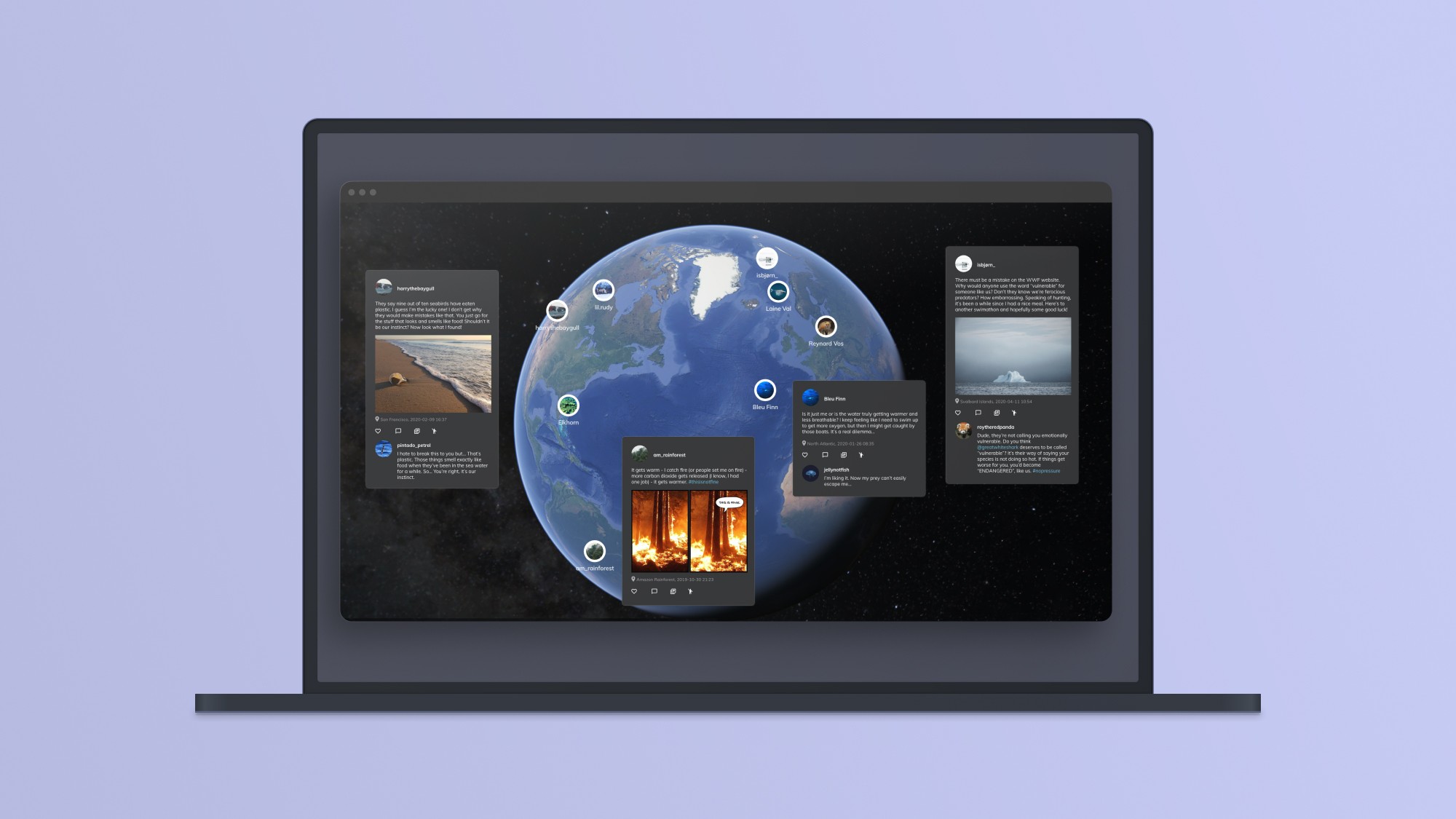

This project was done as part of my MFA thesis – Taking Nature's Perspective.
As human-beings, we rarely think in the perspective of other species, and we don't always see ourselves as an integral part of the ecosystem, resulting in the lack of motivation for environmental conservation. It's also a big challenge to transform environmental awareness into behavioral changes and eco-friendly habits.
Wild Posts is a platform where people create social media posts on behalf of other entities in our ecosystem, intended to help people build empathy with other species and learn about environmental problems in a light-hearted way. With the mobile app, users can pick up eco-friendly behaviors along the way and make positive changes one step at a time.
My thesis explored how we as humans could develop a closer connection and stronger empathy with nature. I did some research in the context of environmental psychology to find out how people connect to nature and the factors that affect people’s eco-friendly behaviors.
I learned that closer connection and stronger empathy with nature are associated with more environmentally responsible behaviors. When people consider themselves to be an integral part of nature and care about other species’ well-being, they tend to act in a more eco-friendly way.

Environmental psychology concepts and their relationship.
Through research, I also found perspective-taking to be an effective approach that helps people recognize the sentience and subjectivity of other species. As an experiment, I created a series of social media posts and conversations in the voices of non-human beings based on the problems they're facing under the environmental conditions.
I found this process to be an educational and eye-opening experience, so I wanted to see what other people would feel about it. I asked people to come up with a post on a social platform of their choice based on something they read about the natural environment. I used a Google Form to collect responses and feedback on their experience. My test users said that the process of creating the post was amusing and it allowed them to learn something they weren't aware of before.

Posts generated from test users' input and the feedback they gave.
Seeing the potential of this format in raising environmental awareness and cultivating empathy with nature, I created a test website to develop this idea further. The platform allows users to compose posts with the content that they come up with. Aside from the main posts stream, a section for recommended articles was also included to potentially expand users' scope.

Main page of the Wild Posts website.
As these posts help people learn about the environmental problems that are impacting other species, it's important to incorporate a call to action and guide people to adopt more eco-friendly habits.
While the social posts serve as an entry point, the system expands to a feedback loop that engages the user on both an awareness level and a behavioral level, in which process users become more psychologically connected with the ecosystem.

To help people shift their behaviors and be persistent, I designed a mobile app that can keep track of users' environmental efforts and nudge people’s everyday actions.

On each post, there is an action button that links to a list of missions for each problem reflected in the posts, guiding the user to take action.
The app provides recommended missions and weekly challenges. The choice is given to the users to pick what they would be will ing to do so they could slowly build up their level of engagement.


Each mission card provides information about the rationale and impact of the action with a link to a more elaborate article, a list of species or natural organisms whose situations would be improved by this mission, and sometimes a tip that provides further guidance.
The missions are categorized by the environmental problems that are related.

The app helps users keep track of their progress and get a sense of fulfillment when they achieve a new level. Different metrics and units are used for different types of actions so each time the user makes an effort, they can see their progress directly reflected.


The “connections” section shows the user’s links to the non-human characters whose posts they’ve responded to. On each character’s profile, the user could see the species’ information, status, and a summary of how much the user is doing to be an ecologically responsible neighbor.
On the user’s own profile page, they could also see the eco-milestones they’ve achieved and the ones they’re working towards, keeping them motivated.


Under different circumstances, the app would also provide suggestions and reminders at actionable moments to keep the user on track of their missions.
